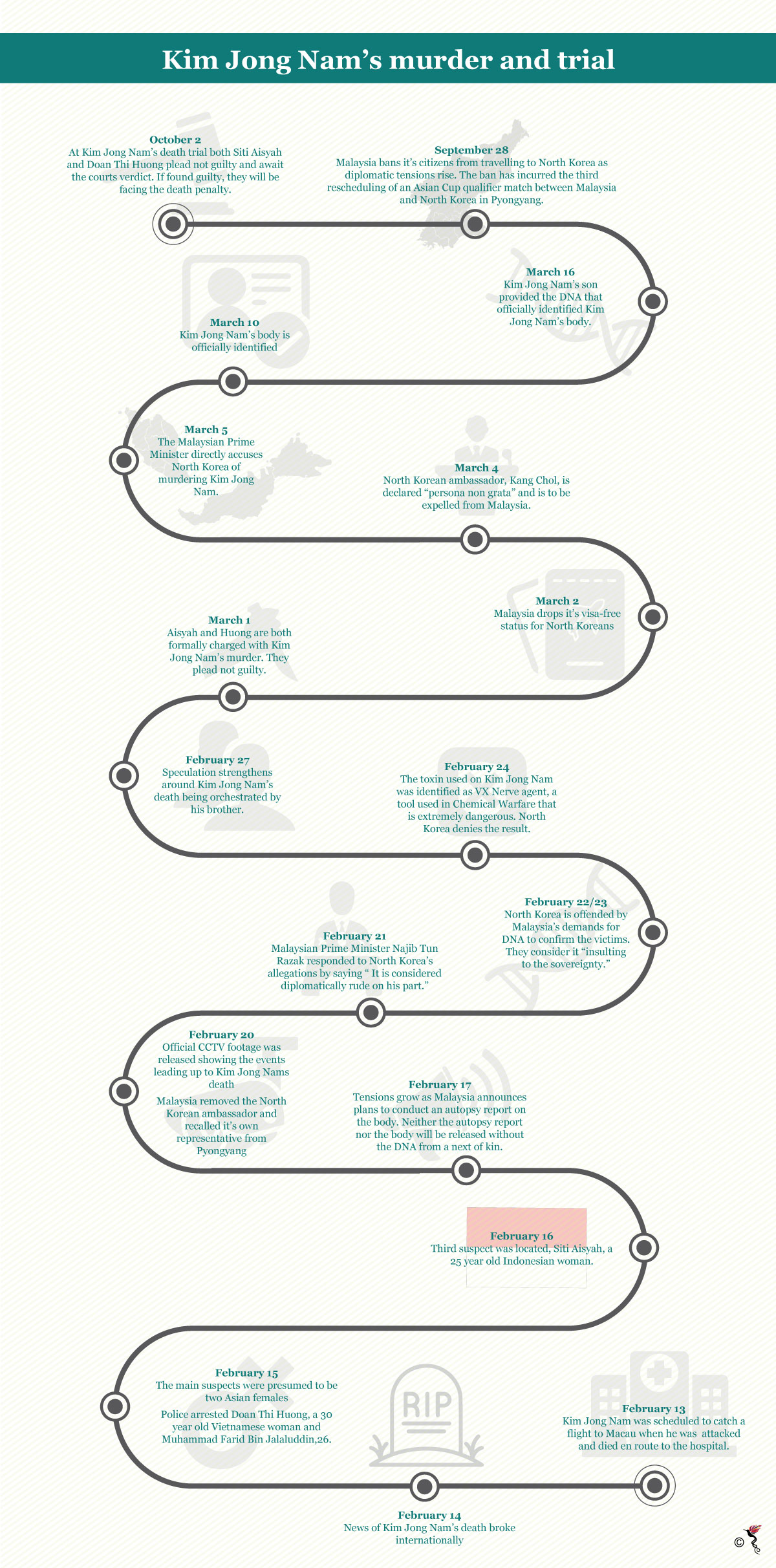Two women went on trial in Malaysia for murdering North Korea supreme leader Kim Jong Un's half brother, Kim Jong Nam. Indonesian Siti Aisyah and Vietnamese Doan Thi Huong pleaded not guilty to the murder. The women, both in their 20s, are accused of rubbing toxic VX nerve agent onto his face. Relations between Malaysia and North Korea soured after the murder.
On February 13, 2017 Nam died about 20 minutes after he was assaulted. The assault took place in Terminal 2 of the Departure Hall in KLIA (Kuala Lumpur International Airport) where he was waiting to board a plane to Macau.
The incident was caught on airport CCTV as the VX rapidly shut down his central nervous system, resulting in his agonising death. The defendants – who face the death penalty if convicted – claimed they were duped into believing they were taking part in a prank for a reality TV show. They were arrested just days after the murder.
The murder sparked an angry row between North Korea and Malaysia with both countries expelling each other's ambassadors.

A timeline of Kim Jong Nam's murder and the conflicts that ensued.
The trial
According to latest information from AFP (Agence France-Presse), the murder charge was read to the defendants in their native languages and interpreters assigned to the defendants indicated they were pleading not guilty.
Prosecutor Muhamad Iskandar Ahmad then read a statement giving details of the murder and said the prosecution had sufficient evidence to prove the women's guilt.
"We will provide evidence that the dead victim was at (Kuala Lumpur International Airport) departure lounge when Siti Aisyah and Doan Thi Huong approached the dead victim and swiped a poisoned liquid on the face and eyes of the victim," he told the court.
"The evidence clearly showed that their action to swipe the poison known as VX caused the death of the victim. Expert evidence will be shown that the VX was the cause of death and the chances to save him were extremely slim."
He said the women had carried out exercises with four other people before the murder to ensure they succeeded in their "common intention" of killing Kim.
VX nerve agent
The CFR (Council on Foreign Relations) stated on its official website that VX is the deadliest nerve agent ever created which is known by its US Army code name. This chemical agent is a clear, colourless liquid with the consistency of motor oil. A fraction of a drop of VX, absorbed through the skin, can "fatally disrupt" the nervous system. The CFR also explained that synthesising the VX nerve agent is complicated and an extremely dangerous process which requires toxic, corrosive chemicals and a sophisticated chemical laboratory. Russia and the US are the only countries that have admitted to having VX or a closely related agent.
Previously, the VX nerve agent was used by the Japanese Aum Shinrikyo cult in a sarin gas attack which killed twelve people in the Tokyo subway system, in March 1995. Some experts also accused Saddam Hussein for using VX against Iranian forces in the 1980-88 Iran-Iraq War and again on another chemical attack on Iraqi Kurds in 1988. The last incident killed about 5,000 people and created serious health problems for thousands more.
Tensions between North Korea and Malaysia
Prior to the murder, Malaysia had been one of Pyongyang's few allies amid a global outcry over the country's nuclear programme. After the assassination sent diplomatic relations plummeting between Pyongyang and Kuala Lumpur, tensions only eased when Malaysia agreed to return Kim's body in March.
US President Trump had even credited Malaysian Prime Minister Najib Razak for cutting off business ties between Malaysia and North Korea. Based on an article published by the New York Times, the Malaysian capital, Kuala Lumpur, served as one of the hubs for North Koreans seeking to buy or sell nuclear-related technology or trade weapons.
On September 28, Malaysia banned its citizens from travelling to North Korea. The AFC (Asian Football Confederation) had also decided to postpone a football match between North Korea and Malaysia in Pyongyang, which was supposed to take place on October 5.
“This incident will not lead to the end of diplomatic ties between Malaysia and North Korea because regardless of current tensions, there are a lot of commonalities between the two countries,” Muhammad Danial Azman, a senior lecturer at the Department of International and Strategic Studies, University of Malaya told The ASEAN Post.
“The recent ban of Malaysians to North Korea does not mean an end to ties, it’s just a preventive measure,” he added while explaining that the travel ban was due to the mounting tensions between North Korea and the US over the former's nuclear programme.
(Swaroopini Nair also contributed to this article.)
